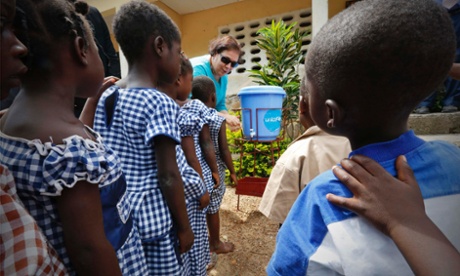Agreement reportedly reached that would mean Australian volunteers are treated in the UK or Germany if infected

Australia appears to be close to announcing practical assistance to contain Ebola in west Africa, with reports the government will help send medical volunteers to Sierra Leone.
Tony Abbott has faced political pressure to deploy teams to the region, but has resisted such action without guarantees that volunteers would have access to medical care and evacuation in the event they contracted Ebola.
The prime minister’s office declined on Tuesday night to confirm a Fairfax Media report that Australia had finalised a deal with the UK for medical assistance.
“Australia continues to consider its response and what more can be done,” Abbott’s spokeswoman said.
Fairfax cited diplomatic sources as saying Australia had reached agreement to manage a British field hospital in Sierra Leone, with an official announcement expected on Wednesday.
Britain would treat Australian volunteers as if they were their own, the report said, and an infected Australian worker could be sent to Britain or Germany for treatment.
Hundreds of medical, logistics and security volunteers could staff and manage the hospital on rotation, Fairfax said.
The arrangement appears to be similar to the one contemplated in talks between Australia and Britain last month.
On 20 October a spokeswoman for the British high commission in Canberra said officials were “in discussions about the potential for the UK to support international personnel who might work in Sierra Leone under our umbrella”.
“These discussions include the possibility of such personnel being medically evacuated under UK auspices should they contract Ebola,” she said at the time.
By last month, Sierra Leone had nearly 3,000 reported cases of the disease, with 930 deaths. Worldwide, the virus has killed nearly 3,900 people.
The Australian Medical Association (AMA) and the Labor opposition have repeatedly called on the government to play a more proactive role in containing the outbreak in west Africa.
The AMA’s president, Brian Owler, said treating Ebola at its source was the only way of stopping its spread.
“If it’s true, the AMA will welcome the announcement,” he said on Tuesday. “It’s what we’ve been pushing for for six weeks now.
“It’s unclear why it has taken six weeks to get to this point, though we understand the need to put processes in place. Our focus now is on making sure personnel are properly trained and get all the resources they need.”
Abbott told parliament last month that Australia’s allies had asked for more help in the fight against the Ebola outbreak and requests from the US, UK and Sierra Leone would be “carefully” considered.
This followed testimony from department of foreign affairs officials to a Senate estimates committee hearing that the government had received requests from those countries as early as September.
The government has been reluctant to send Australians to west Africa until an “iron-clad” agreement on evacuating health workers had been reached. A super-committee encompassing senior members of several public service departments was looking at issues relating to the deployment of Australian health workers.
